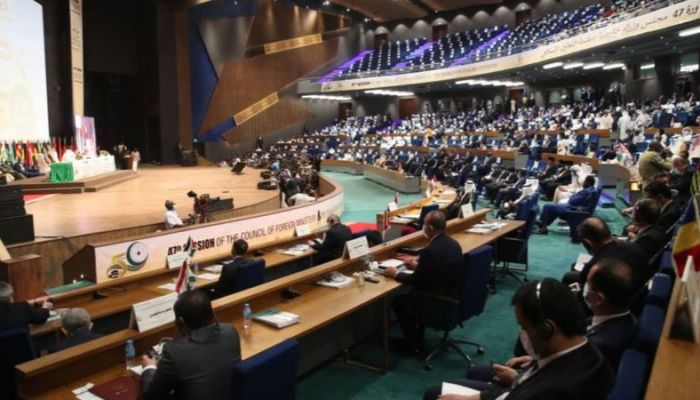
Desk Report
Publish: 30 Nov 2020, 11:49 pm

A two-day meeting of the foreign ministers of the 57-nation OIC, a West African country, unanimously passed a resolution on Saturday condemning the repeal of Article 370 of the Indian Constitution and the denial of special status to Jammu and Kashmir.
India has even been urged to reverse that decision on August 5 last year. At the same time, the OIC resolution expressed concern over the human rights situation in India-administered Kashmir.
Kashmir has been condemned for "fake encounters", extrajudicial killings, "search and siege" operations and the destruction of Kashmiris' homes and private property as a tactic of punishment, firing "pellet" bullets at civilians and "harassment of Kashmiri women at the hands of Indian soldiers".
The OIC resolution called on the international community to "reconsider" its relations with India in view of India's "violation of international and international human rights law, ignoring international proposals" in Kashmir.
The OIC reiterated that Kashmir was an unresolved issue and that "the issue of Kashmiris' right to self-determination has been on the UN agenda for the last 60 years."
Pakistan has been pressuring the OIC for the last one and a half years to issue a statement on Kashmir, so it is happy with Saturday's proposal.
India's anger
But the Indian government has expressed outrage. The language of the statement issued by the Indian Ministry of External Affairs on the OIC proposal is very strong.
"Union Territory of Jammu and Kashmir is an integral part of India and we have always said that the OIC has no jurisdiction to discuss any internal issues of India," the Indian statement said.
The Indian government said in a statement that the OIC proposal on India was "factually incorrect and unwelcome" and that India was "completely rejecting" those statements.
The BBC's Bangla Shubhjyoti Ghosh in Delhi says the Indian government is angry, but also somewhat surprised and embarrassed by the OIC's statement. He said India had hoped that no statement would be made at the OIC meeting on Kashmir as it was not on the agenda.
That is why the statement was somewhat unexpected to the Indian Foreign Office. Officials are also a little embarrassed because they think what the OIC said or did not say has some symbolic significance. "
However, Shubhjyoti Ghosh says Indian diplomats do not think that their current relationship with Saudi Arabia or the UAE will put much pressure on Kashmir from the Muslim and Arab worlds.
Cheerful Pakistan
But Pakistani government leaders have been making statements over the past two days trying to portray it as a diplomatic success. The OIC's proposal is also being reported in the Pakistani media.
A responsible and impartial daily like Dawn wrote in an editorial on Monday, "The good news is that even though Kashmir is not on the agenda of the OIC meeting, Pakistan seems to have finally achieved a significant diplomatic success."
Pakistan has been pressing the OIC for a special meeting on Kashmir since August last year. However, the fact that this was not possible mainly due to Saudi Arabia's objections has been made clear in various statements by Pakistani government leaders in recent months.
Even the Prime Minister of Pakistan himself expressed his displeasure during his visit to Malaysia in February.
Pakistan's foreign minister has openly criticized Saudi Arabia, threatening to form an alternative Muslim alliance with Turkey and other countries.
There are indications in the Pakistani media that Saudi Arabia may have softened its stance in the face of Pakistan's negotiations.
Masood Khan, a member of the Pakistani delegation to the OIC and president of Pakistan-administered Kashmir, tweeted: "Turkey, myself and Pakistan raised the Kashmir issue at the opening ceremony on Friday, and the Saudi foreign minister supported Pakistan's statement that peace in the region is not possible without resolving the Kashmir issue."
How important is the OIC statement?
But how important is a statement from the OIC? How big an achievement is this for Pakistan? How much pressure will India have on Kashmir?
Former Foreign Secretary of Bangladesh Touhid Hossain thinks that the importance and influence of OIC as an alliance is less now than ever before.
"There is more disunity than unity among Muslim countries now. Violent enmity between one country and another. As a result, any alliance among such countries loses its importance. ”
He said there is no such thing as a statement or just a word. He gave the example - "Many countries in the world want the Rohingya to be taken back to Myanmar. But they are not putting any pressure on Myanmar. As a result, nothing much is happening ... I think the OIC statement on Kashmir will remain in the same statement. It has happened before. ”
Mr. Hussein thinks that the kind of polarization and factionalism that is going on in the geopolitics of the Middle East and Asia does not bother Kashmir or many Muslim countries with the Muslims of Kashmir.
"India is now more important to Pakistan than Saudi Arabia, the UAE or many Arab countries. The Indian market is more important to them than the Muslims in Kashmir."
“Pakistan is a member of the OIC. So the coalition's proposal may reflect Pakistan's demands. Saudi Arabia may have given Pakistan some leeway due to pressure. But I don't think there will be any change in the real situation. "
Subscribe Shampratik Deshkal Youtube Channel
© 2024 Shampratik Deshkal All Rights Reserved. Design & Developed By Root Soft Bangladesh